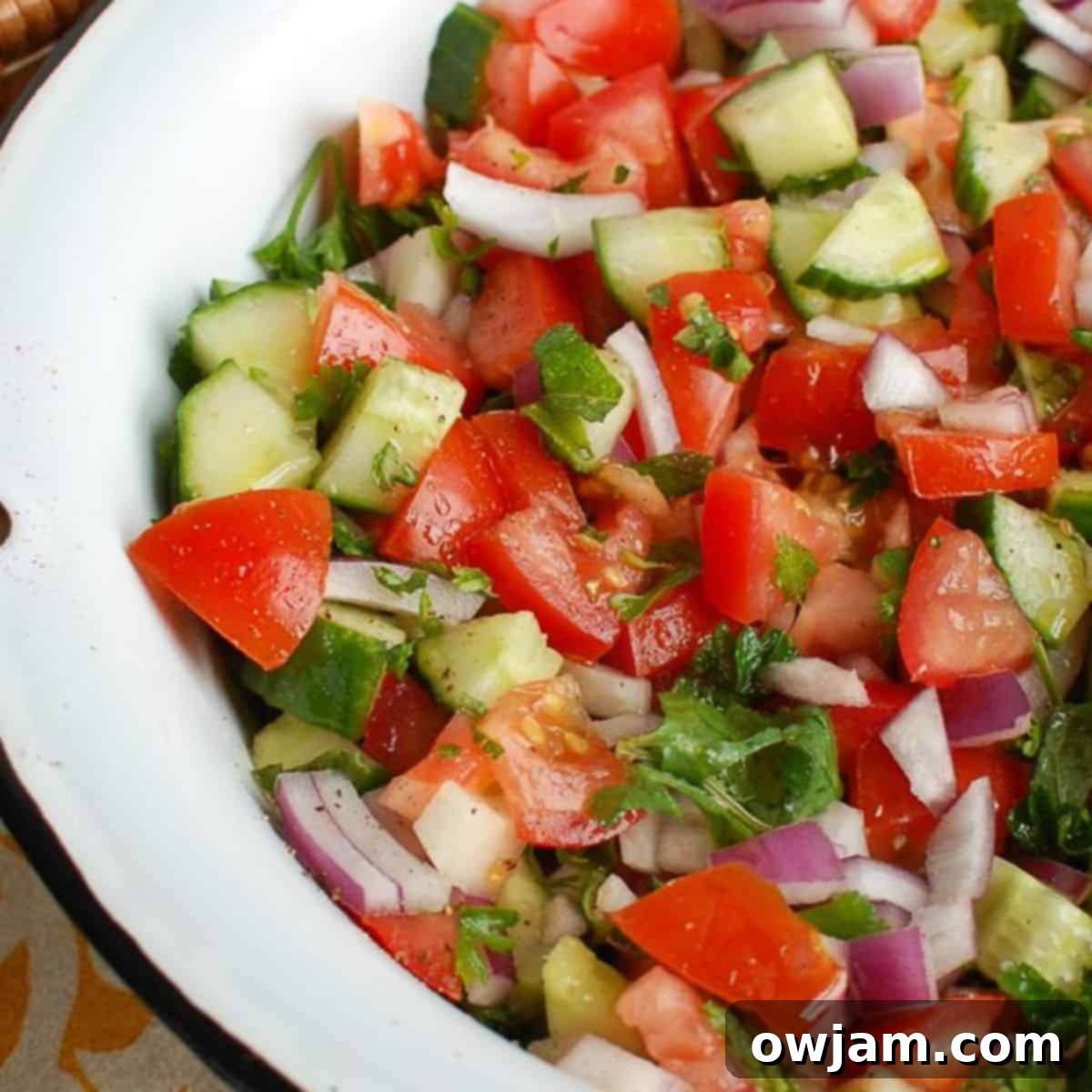Authentic Israeli Salad: A Fresh, Healthy & Easy Mediterranean Staple
Discover the vibrant flavors of the Middle East with this simple yet incredibly flavorful Israeli Salad. Made with a medley of fresh, healthy ingredients, this Mediterranean-inspired dish is a celebration of crisp cucumbers, juicy tomatoes, sharp red onion, and fragrant fresh herbs, all brought together with a light, zesty dressing. Whether you’re looking for a refreshing side dish or a versatile base for your favorite proteins, this salad effortlessly complements grilled chicken, succulent lamb, tender beef, or delicate seafood.
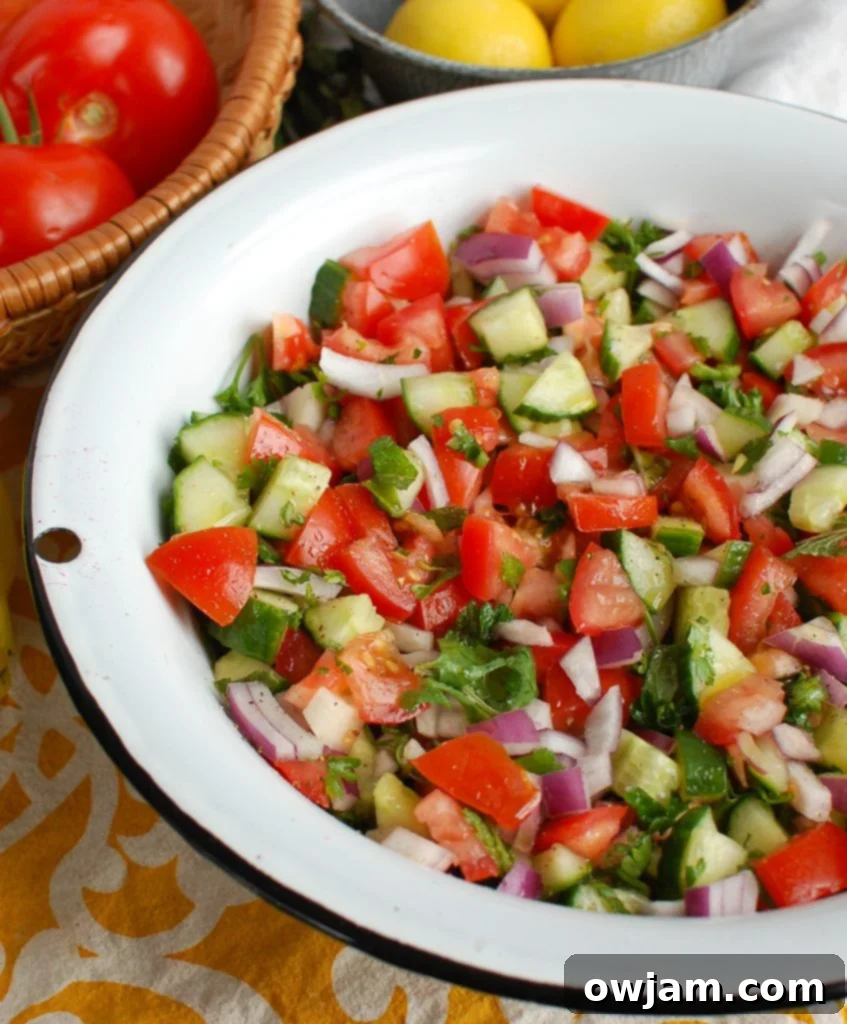
This Israeli Salad recipe is a staple in my kitchen, a dish I find myself returning to time and again. Its simplicity and refreshing nature make it a perfect fit for a regular rotation alongside favorites like my Mediterranean Eggplant Salad and the delightful Persian Tomato Cucumber Salad. All these recipes share a common thread: they rely on the freshest, most straightforward ingredients, elevated by aromatic fresh herbs and a simple, homemade dressing.
Fitting beautifully into the principles of the Mediterranean diet, this Israeli salad is not only vegan and plant-based but also an exceptional way to utilize the bounty of farmers’ markets or your very own garden, especially during the warmer months. Its vibrant colors and crisp textures make it an inviting addition to any meal, promising both nourishment and satisfaction.
Beyond its culinary appeal, Israel remains high on my travel bucket list, much like Lebanon. I’ve heard countless wonderful stories about its rich history, diverse culture, and, of course, its incredible food scene. A trip to Israel, I imagine, would be an immersive journey through ancient landscapes and an exquisite exploration of authentic Mediterranean flavors, where fresh salads like this one are a cornerstone of daily life.
While I haven’t yet had the pleasure of experiencing an authentic Israeli Salad directly from its source, this recipe is meticulously crafted based on observations from Middle Eastern restaurants and insights from friends and travelers who have visited the region. Growing up in a family that frequently prepared Middle Eastern dishes, I’ve always cherished the opportunity to explore the diverse cuisines of this region. It’s fascinating how many culinary similarities exist between countries in the Middle East, a testament to shared traditions and ingredients.
Indeed, countries like Lebanon and Israel share a rich tapestry of common foods, ingredients, and recipes. This simple Israeli Salad is a prime example, often reminding me of the Easy Lebanese Salad, a dish widely enjoyed and frequently made in Lebanese households. The essence of fresh, finely chopped vegetables and a bright lemon-olive oil dressing is a unifying element across these regional culinary traditions, making this salad a delightful bridge between cultures.
This salad isn’t just a side dish; it’s a versatile foundation that can be adapted to countless meals. Its simple yet profound flavor profile allows it to shine whether served alongside grilled meats, as a refreshing component in a grain bowl, or even as a light and healthy snack. The key lies in the quality of the fresh ingredients and the thoughtful preparation, ensuring every bite is bursting with taste and texture.
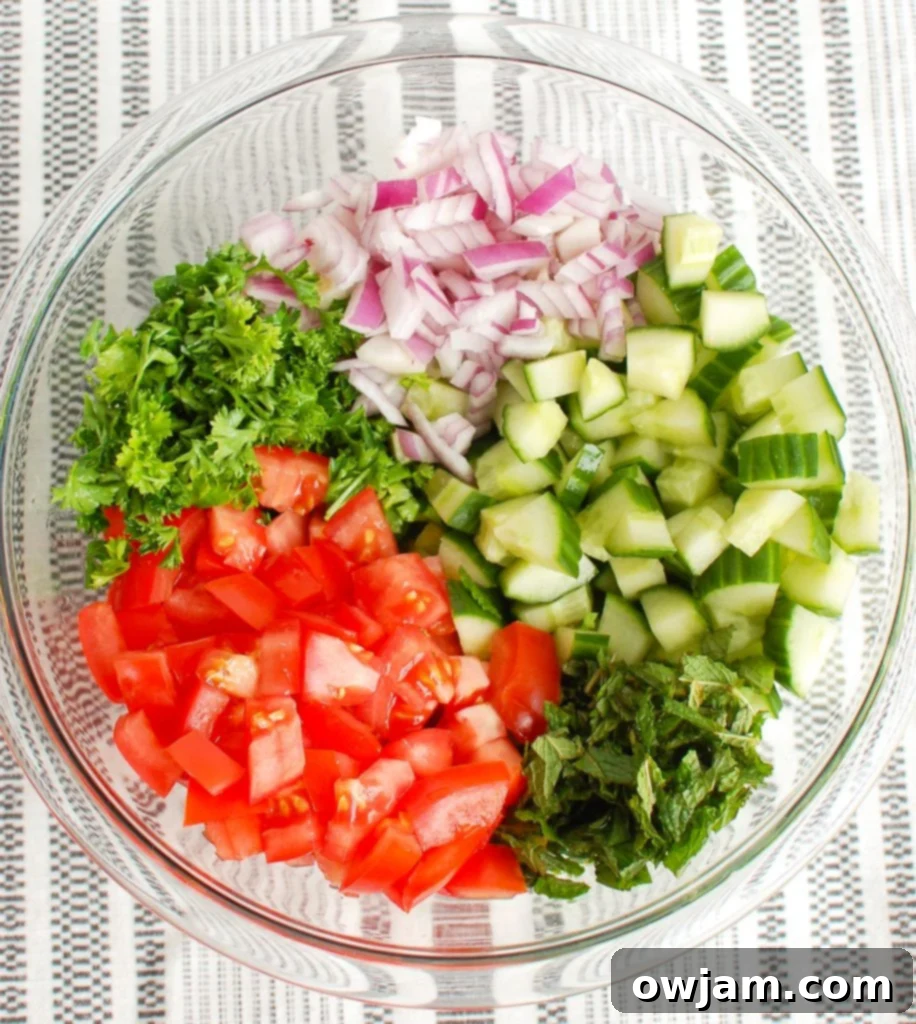
Recipe Ingredients You’ll Need for a Perfect Israeli Salad
Crafting an exceptional Israeli Salad requires attention to fresh, high-quality components. Here’s a closer look at what you’ll need:
- Fresh Vegetables: At the heart of any great Mediterranean-inspired salad are its vibrant, fresh vegetables. For an authentic Israeli salad experience, prioritize ripe tomatoes, crisp red onion, and especially Persian cucumbers. Persian cucumbers are ideal due to their thin skin and minimal seeds, offering a tender bite without the need for peeling. If Persian cucumbers are unavailable, English cucumbers or even regular garden cucumbers (peeled and deseeded if necessary) can be substituted. The secret to the signature “chopped salad” feel lies in dicing all your vegetables into small, uniform pieces, ensuring every spoonful offers a delightful mix of flavors and textures.
- Fresh Herbs: Herbs are the soul of this salad, infusing it with unparalleled freshness and depth of flavor. I generously use both fresh mint and curly parsley in this recipe, as their bright notes are quintessential to Middle Eastern cuisine. However, don’t hesitate to experiment! Adding fresh dill can introduce a lovely anisy undertone, while cilantro offers a bright, citrusy punch. The more fresh herbs, the more aromatic and authentic your salad will taste.
- Homemade Dressing: Step away from the store-bought bottles! A simple, homemade dressing makes all the difference, allowing you to control the quality of ingredients and tailor the flavors to your preference. This Israeli Salad calls for a classic, light dressing made with robust extra virgin olive oil and freshly squeezed lemon juice. The tartness of the lemon beautifully cuts through the richness of the oil, creating a balanced and refreshing finish that enhances rather than overpowers the vegetables. Adjust the ratio to find your perfect balance of tang and richness.
Please see the recipe card below for exact ingredient amounts and detailed instructions.
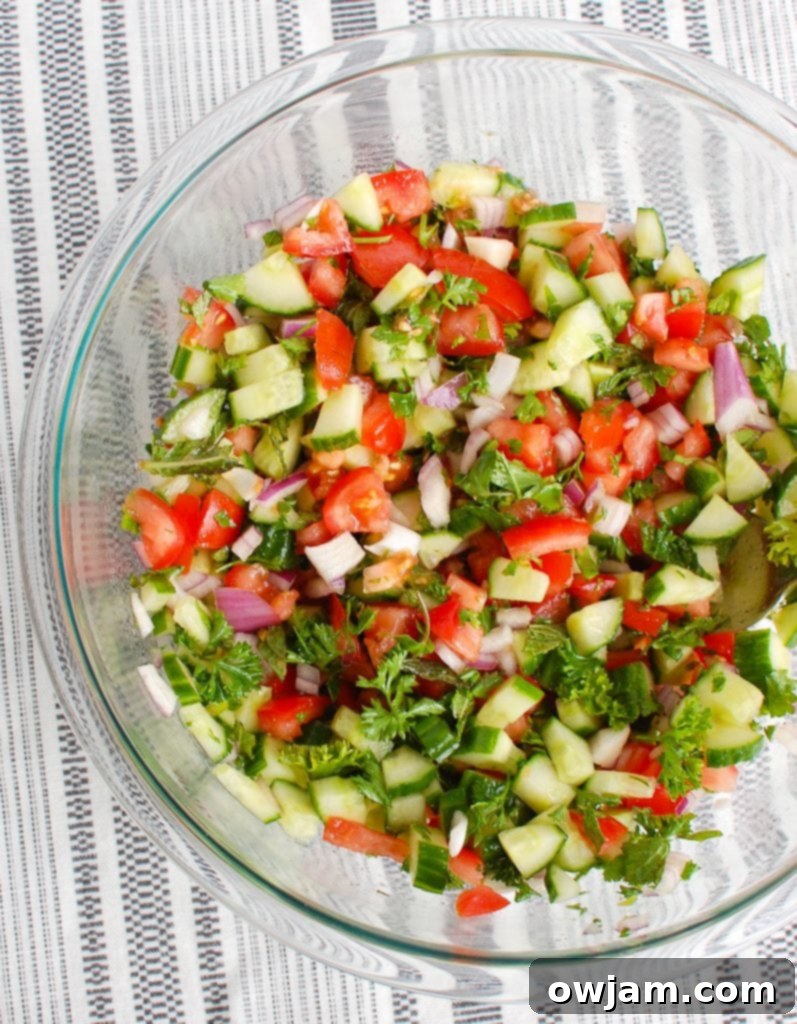
Recipe Tips and Modifications: Elevate Your Israeli Salad
While the classic Israeli Salad is perfect in its simplicity, there are many ways to customize it to suit your taste and dietary needs. Here are some tips and modifications to make this dish truly your own:
- Spices: Introduce an exciting layer of flavor with aromatic spices. Sumac, with its tangy, lemony profile, is a fantastic complement to the dressing and a staple in Middle Eastern cooking. Za’atar, a blend of dried herbs, sesame seeds, and sumac, offers an earthy, nutty dimension that is simply irresistible. For a touch of warmth, consider a pinch of paprika or oregano. If you enjoy a bit of heat, a tiny dash of cayenne pepper can provide a welcome kick without overwhelming the fresh ingredients.
- Vegetables: The traditional Israeli salad is beautifully minimalist, focusing on cucumber, tomato, and onion. However, this simplicity also makes it incredibly adaptable. Feel free to incorporate other crunchy vegetables you have on hand. Finely diced bell peppers (red, yellow, or orange) add sweetness and color. Small cubes of zucchini can provide an extra layer of freshness. For those who love a bit of heat, finely chopped jalapeños or serrano peppers can add a fiery element.
- Uses: This versatile salad extends far beyond a simple side dish. Get creative with how you integrate it into your meals! It makes a brilliant addition to a Chicken Shawarma Rice Bowl, lending a fresh contrast to savory grains and meat. Serve it alongside Grilled Beef Kafta Kebabs or with Tahini Grilled Chicken Breasts for a complete and balanced meal. It also pairs wonderfully with Shish Tawook Chicken, cutting through the richness of the marinated poultry. Don’t forget its potential as a topping for creamy hummus or as a refreshing component in warm pita wraps, adding crunch and tang to every bite.
- Protein: Transform this side salad into a hearty main course by adding a protein. Grilled meats are an excellent choice, especially during summer barbecues. Cubes of perfectly seasoned grilled beef, lamb, or chicken integrate seamlessly with the salad’s flavors. For a lighter, yet equally satisfying option, consider adding flaky grilled fish like salmon, cod, or even pan-seared halloumi cheese for a vegetarian alternative. These additions not only boost the nutritional value but also make the salad a more filling and satisfying meal.
- Beans: For a plant-based way to add substance and protein, incorporate beans into your Israeli Salad. Chickpeas (garbanzo beans) are a classic Mediterranean choice, offering a creamy texture and nutty flavor. White beans, such as cannellini or great northern beans, also work beautifully, adding a mild taste and soft consistency that complements the crisp vegetables. Rinsed and drained, they can be tossed directly into the salad, providing a wholesome and satisfying boost.
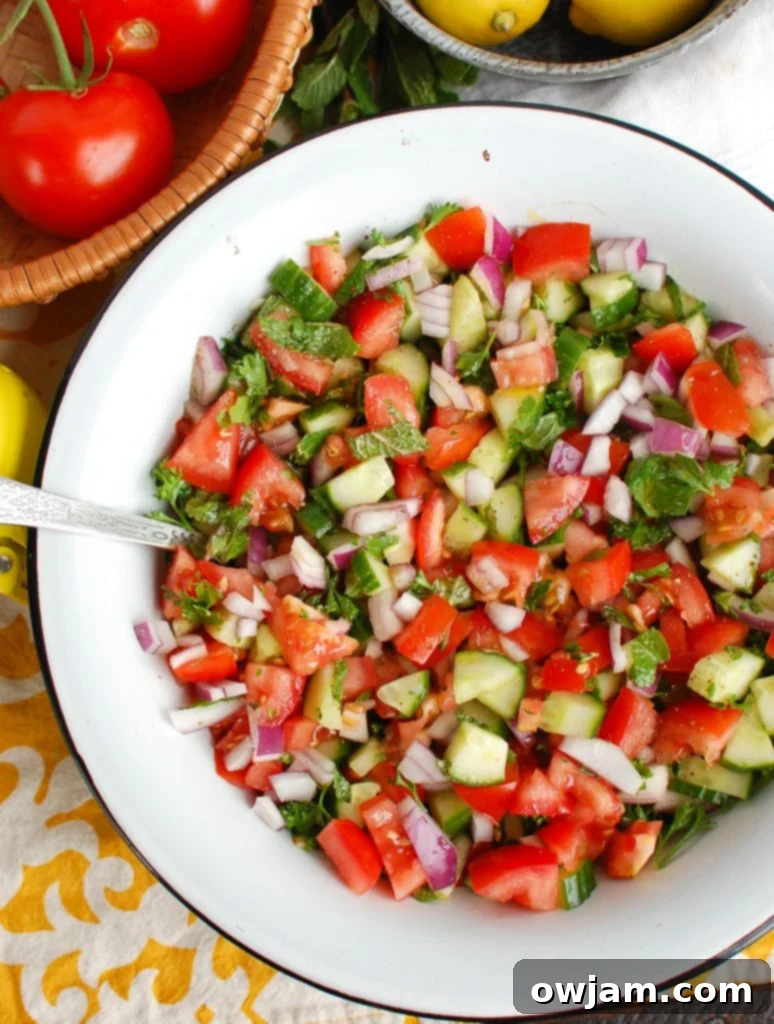
Recipe FAQ: Your Questions Answered
For the best results, use Persian or English cucumbers. These varieties are highly recommended because they are virtually seedless (or have very small, edible seeds) and possess thin, tender skins, eliminating the need for peeling. Their firm texture and refreshing flavor are perfect for a crisp Israeli salad.
Yes, you can certainly prepare components of this salad ahead of time, but it truly shines when eaten fresh. To prevent sogginess, chop your vegetables (cucumbers, tomatoes, onion) and store them separately in airtight containers in the refrigerator. You can also pre-make the olive oil and lemon dressing and keep it in a separate sealed jar. Assemble the salad and dress it just before serving to maintain maximum freshness and crunch. This method allows for quick preparation when mealtime arrives.
More Salad Recipes You’ll Love
Salads
Summer Orzo Pasta Salad
Vegetarian
Greek Orzo Pasta Salad
Mediterranean
Mediterranean Eggplant Chickpea Salad
Vegetarian
Zucchini Quinoa Chickpea Salad
Tried this recipe? Leave a star rating and comment below! Subscribe to my newsletter or follow me on
Facebook,
Instagram, or
Pinterest for the latest.
Israeli Salad
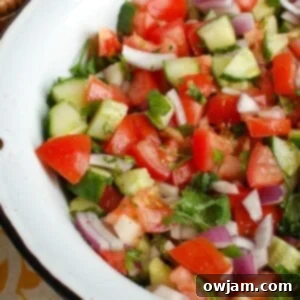
Pin
Ingredients
- 1 pound Persian or English cucumbers, diced {you can use English cucumbers}
- 1 pound cherry tomatoes, cut into quarters
- 1/4 cup red onion, diced
- 1/4 cup fresh curly parsley, chopped
- 1/4 cup fresh mint, chopped
- 3 tablespoons extra virgin olive oil
- 2 tablespoons lemon juice
- Salt & pepper to taste
- Optional: 1 or 2 teaspoons of Sumac or Za’atar
- Optional: 1/4 cup fresh cilantro, chopped
Instructions
-
In a large mixing bowl combine the cucumbers, tomatoes, red onion, parsley and mint.
-
In a mason jar or small bowl whisk together the olive oil and lemon juice.
-
Pour the dressing over the salad and gently toss.
-
Taste and add salt and pepper to taste along with any spices you desire {sumac or za’atar work great}.
-
Serve immediately, or refrigerate in a sealed container for up to 3 days.
Nutrition
Nutrition information is automatically calculated, so should only be used as an approximation.
